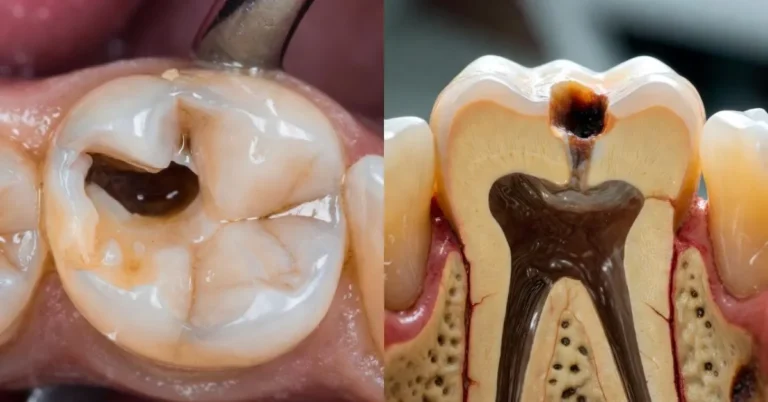From Gaps to Gorgeous: Dental Implants Before and After
Understanding Dental Implants
Dental implants have become an increasingly popular option for replacing missing teeth. They offer a permanent and natural-looking solution that can restore both the appearance and functionality of your smile. In this section, we will delve into what dental implants are and the process of getting them.
What are Dental Implants?
Dental implants are artificial tooth roots that are surgically placed into the jawbone to provide a sturdy foundation for replacement teeth. They are typically made of biocompatible materials such as titanium, which fuse with the jawbone through a process called osseointegration. This integration ensures that the implants become a stable and long-lasting support for the replacement teeth.
By mimicking the natural tooth structure, dental implants offer several advantages over other tooth replacement options such as dentures or bridges. They provide a more secure and permanent solution, allowing individuals to eat, speak, and smile with confidence. Dental implants also help to preserve the integrity of the jawbone, preventing bone loss that can occur when teeth are missing.
The Process of Getting Dental Implants
The journey to dental implants typically involves several stages and requires the expertise of a dental professional. Here is a general overview of the process:
-
Initial Consultation and Assessment: During your first visit, the dentist will evaluate your oral health, examine your jawbone, and assess your suitability for dental implants. X-rays or CT scans may be taken to determine the condition of your jawbone and plan the implant placement. The dentist will also discuss the treatment timeline and address any concerns or questions you may have.
-
Dental Implant Procedure: The placement of dental implants is usually performed in multiple stages. In the first stage, the oral surgeon or dentist will surgically place the implant into the jawbone. After the implant is placed, a healing period of several months is necessary to allow osseointegration to occur. In some cases, a temporary restoration may be placed to maintain aesthetics and function during the healing phase. Once osseointegration is complete, the final restoration, such as a crown or bridge, is attached to the implant.
-
Post-Implant Care and Follow-Up: After the completion of the dental implant procedure, proper care and maintenance are crucial for the long-term success of the implants. This includes practicing good oral hygiene habits, such as brushing, flossing, and rinsing with an antibacterial mouthwash. Regular dental check-ups are also important to monitor the health of the implants and address any issues that may arise. For more information on maintaining and caring for dental implants, refer to our article on dental implants near me.
The process of getting dental implants may vary depending on individual circumstances. Factors such as the number of missing teeth, the condition of the jawbone, and the type of restoration required can influence the treatment plan. It’s recommended to consult with a dental professional to determine the best approach for your specific needs.
Understanding what dental implants are and the process involved can help you make an informed decision about whether they are the right solution for you. In the next section, we will explore the benefits of dental implants and the improvements they can bring to your smile and oral health.
Before and After Dental Implants
Undergoing dental implant treatment can be a life-changing experience, restoring both the function and aesthetics of your smile. The process of getting dental implants involves several stages, starting from the initial consultation and assessment, followed by the implant procedure itself, and concluding with post-implant care and follow-up.
Initial Consultation and Assessment
Before embarking on the dental implant journey, an initial consultation and assessment are essential. During this stage, your dentist will evaluate your oral health, examine your jawbone structure, and assess your suitability for dental implants. X-rays and scans may be taken to determine the condition of your jawbone and to identify the optimal placement for the implants.
Additionally, your dentist will discuss your treatment goals, explain the procedure in detail, and address any concerns or questions you may have. This is also an opportunity for you to discuss your dental and medical history, as well as any medications you may be taking. By gathering all the necessary information, your dentist can develop a personalized treatment plan tailored to your needs.
Dental Implant Procedure
Once the initial consultation and assessment are complete, the dental implant procedure can begin. This procedure is typically performed in multiple stages, allowing for proper healing and integration of the implants with the jawbone.
The first stage involves the surgical placement of the dental implant posts into the jawbone. This is done under local anesthesia to ensure a comfortable experience. The implants are strategically positioned to provide optimal support for the replacement teeth or dental prosthesis.
After the implant posts are placed, a healing period of several months is necessary to allow osseointegration to occur. This is the process where the implants fuse with the jawbone, providing a stable foundation for the replacement teeth.
Once the implants have fully integrated, the second stage of the procedure can begin. This involves attaching abutments to the implant posts, which will serve as connectors between the implants and the replacement teeth. Impressions are taken to create custom-made dental crowns, bridges, or dentures that will be securely attached to the abutments.
Post-Implant Care and Follow-Up
After the dental implant procedure, proper post-implant care and follow-up are crucial for successful healing and long-term success. Your dentist will provide you with specific instructions on how to care for your implants and maintain good oral hygiene.
It is important to practice regular oral hygiene habits, such as brushing your teeth twice a day, flossing daily, and using antimicrobial mouthwash. Your dentist may recommend using interdental brushes or water flossers to clean around the implant areas effectively. Regular dental check-ups are also essential to monitor the health of your implants and address any concerns.
By following the recommended oral hygiene practices and attending regular dental check-ups, you can help ensure the longevity and success of your dental implants. In our article on full mouth dental implants cost, you can explore more about the cost factors associated with dental implant treatment. Additionally, if you’re considering alternatives to dental implants, check out our article on dental implants vs dentures for more information.
Remember, the journey of dental implants doesn’t end with the procedure itself. Continued care and maintenance are essential for enjoying the benefits of a beautiful, functional smile for years to come.
Transforming Your Smile
Dental implants have the remarkable ability to transform your smile and improve your overall oral health. Let’s explore the benefits of dental implants, the improvements they bring to your appearance and function, and the long-term oral health benefits they provide.
Benefits of Dental Implants
Dental implants offer numerous benefits that make them a popular choice for individuals seeking to restore missing teeth. Some of the key advantages include:
-
Natural Look and Feel: Dental implants are designed to closely resemble natural teeth in both appearance and function. They are custom-made to match the color, shape, and size of your existing teeth, ensuring a seamless integration with your smile.
-
Enhanced Chewing and Speaking: Unlike other tooth replacement options, dental implants are securely anchored in the jawbone. This stability allows you to chew and speak with confidence, without worrying about the implants shifting or slipping.
-
Improved Self-Esteem: Missing teeth can have a significant impact on your self-esteem and confidence. Dental implants provide a long-lasting solution that can restore your smile and help you feel more comfortable and confident in social situations.
-
Durability and Longevity: With proper care and maintenance, dental implants can last a lifetime. They are made from durable materials such as titanium, which is biocompatible and resistant to decay.
For more information on dental implants, including the procedure and cost, visit our article on dental implants near me.
Improvements in Appearance and Function
One of the most noticeable transformations that dental implants bring is an improvement in both appearance and function. The replacement teeth are designed to blend seamlessly with your natural teeth, resulting in a more aesthetically pleasing smile. The implants also provide stability and support for your jawbone, preventing bone loss and maintaining the contours of your face.
From a functional standpoint, dental implants allow you to enjoy your favorite foods without any restrictions. They provide the necessary strength and stability to bite and chew with ease, making it easier to maintain a balanced and nutritious diet. Additionally, dental implants can improve your speech, eliminating any slurring or difficulty in pronouncing certain words that may have been caused by missing teeth.
Long-Term Oral Health Benefits
Beyond the immediate improvements in appearance and function, dental implants offer long-term oral health benefits. When a tooth is lost, the underlying jawbone can start to deteriorate over time due to lack of stimulation. Dental implants act as artificial tooth roots, stimulating the jawbone and preventing bone loss. This helps to maintain the structure and integrity of your facial features.
Furthermore, dental implants do not require alterations to the adjacent teeth, unlike other tooth replacement options such as bridges. This preserves the natural tooth structure and enhances the long-term oral health of your remaining teeth.
Regular dental check-ups and proper oral hygiene practices are essential to ensure the longevity and success of your dental implants. For more information on maintaining and caring for your dental implants, refer to our article on dental implants procedure.
By understanding the benefits of dental implants, the improvements they bring to your appearance and function, and the long-term oral health benefits they provide, you can make an informed decision about whether dental implants are the right option for you. Consult with a dental professional to determine if dental implants are a suitable choice for your specific dental needs and goals.
Maintenance and Care for Dental Implants
Once you have undergone the transformative process of getting dental implants, it’s essential to prioritize their maintenance and care. Proper oral hygiene practices, regular dental check-ups, and implementing certain tips can help prolong the lifespan of your dental implants and ensure their optimal function.
Oral Hygiene Practices
Maintaining good oral hygiene is crucial for the long-term success of dental implants. Here are some oral hygiene practices to follow:
-
Brushing: Brush your teeth at least twice a day using a soft-bristled toothbrush and fluoride toothpaste. Gently clean the implant-supported restoration, ensuring you reach all areas around the implant.
-
Flossing: Use dental floss or interdental brushes to clean between your teeth and implants. This helps remove plaque and food particles that can accumulate and lead to gum disease or implant failure.
-
Rinsing: Incorporate an antimicrobial mouthwash into your daily routine to help reduce bacteria and maintain good oral health.
-
Avoiding Tobacco: If you smoke or use tobacco products, consider quitting. Tobacco use can increase the risk of implant failure and other oral health complications.
Regular Dental Check-ups
Regular dental check-ups are essential for monitoring the health of your dental implants and overall oral well-being. During these appointments, your dentist will:
-
Evaluate: Your dentist will examine the condition of your implants, surrounding teeth, and gums. X-rays may be taken to assess the bone density and ensure proper integration of the implants.
-
Clean: Professional dental cleaning helps remove any plaque or tartar buildup that may have accumulated around the implants.
-
Address Concerns: If you have any concerns or experience changes in your oral health, such as pain, swelling, or discomfort around the implants, it’s important to communicate this to your dentist during your check-up.
Regular dental check-ups, combined with diligent oral hygiene practices, can help detect any potential issues early on and prevent complications.
Tips for Prolonging Dental Implant Lifespan
To ensure the longevity of your dental implants, consider the following tips:
-
Maintain a Healthy Lifestyle: A well-balanced diet and regular exercise contribute to overall oral health and can positively impact the success of your dental implants.
-
Protect Against Teeth Grinding: If you grind your teeth, discuss with your dentist the possibility of using a nightguard to protect your implants and natural teeth from excessive wear and damage.
-
Avoid Excessive Force: Be mindful of habits like biting on hard objects or using your teeth as tools, as these can place excessive force on your dental implants and potentially lead to complications.
-
Attend Regular Dental Cleanings: Regular dental cleanings are vital for the maintenance of your dental implants. Your dentist will remove any plaque or tartar buildup and assess the overall health of your implants.
By implementing these maintenance tips and following proper oral hygiene practices, you can help ensure the longevity and success of your dental implants. Remember to schedule regular dental check-ups and promptly address any concerns or changes in your oral health. For more information on dental implants, be sure to explore our articles on dental implants near me, dental implants procedure, full mouth dental implants cost, and dental implants vs dentures.







